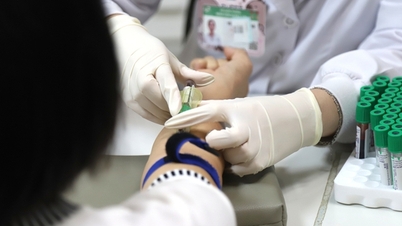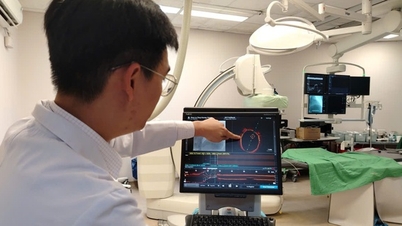Heavy exercise, sudden increase in intensity of exercise or overexertion can cause a sudden increase in blood pressure. It is normal for blood pressure to increase during high-intensity exercise. However, this condition will be dangerous for people with weak hearts or clogged arteries, according to the health website Livestrong (USA).

Some simple tests can help detect heart problems early, thereby reducing the risk of heart attacks in the gym.
PHOTO: AI
In many cases, heart problems such as coronary artery disease, arrhythmias, or hypertrophic cardiomyopathy go unnoticed until the person exerts himself and feels uncomfortable. These are all conditions that are more likely to develop if you smoke, maintain a poor diet for a long time, or have uncontrolled diabetes.
To prevent cardiovascular events in the gym, gym-goers can undergo a number of tests. This is especially important for people over 30 who have an unhealthy lifestyle, a family history of heart disease, or are new to exercise. These tests include:
Electrocardiogram
An electrocardiogram (ECG) is a basic test that records the electrical signals of the heart. The test detects abnormalities such as arrhythmias, which can predict the risk of sudden heart failure. An electrocardiogram is painless and quick.
Echocardiography
Ultrasound provides live images, evaluating the structure and function of the heart. Based on ultrasound images, doctors will detect problems such as hypertrophic cardiomyopathy, heart valve disorders and other heart defects.
Cardiac stress test
The TMT test, also called a treadmill test, evaluates the heart's performance under physical stress. The doctor will ask the person to walk or run on a treadmill while the heart's activity is monitored.
This test is especially useful in detecting blocked blood vessels or poor circulation, which often present as shortness of breath or a rapid decline in running endurance.
Troponin and NT-proBNP testing
These are blood tests that check for early signs of stress or injury to the heart. High troponin levels indicate damage to the heart muscle. Meanwhile, increased NT-proBNP is a warning sign that the heart is overstretched, often due to blood congestion and high pressure in the heart chambers.
Hs-CRP and ESR test
Inflammation plays an important role in heart disease. The ESR test measures the erythrocyte sedimentation rate, which reveals the overall inflammation of the heart.
Meanwhile, the hs-CRP test measures the amount of C-reactive protein (CRP) in the blood. This test helps detect and monitor mild inflammation or the risk of cardiovascular diseases caused by inflammation, such as atherosclerosis.
Lipid and HbA1c Test
These tests check cholesterol and blood sugar levels. High cholesterol and uncontrolled diabetes are two major causes of heart disease and stroke. Early detection allows for dietary and medical intervention.
Many people think these screening tests are only for the elderly or professional athletes. However, experts say that in some cases, these tests can be life-saving. People with underlying heart problems will be detected, advised by their doctors and choose the right exercise, thereby avoiding the risk of heart attack or sudden death in the gym, according to Livestrong .
Source: https://thanhnien.vn/6-xet-nghiem-can-lam-de-tranh-nguy-co-dau-tim-185250814123333036.htm







![[Photo] Prime Minister Pham Minh Chinh meets with representatives of outstanding teachers](https://vphoto.vietnam.vn/thumb/1200x675/vietnam/resource/IMAGE/2025/11/15/1763215934276_dsc-0578-jpg.webp)




























































































Comment (0)